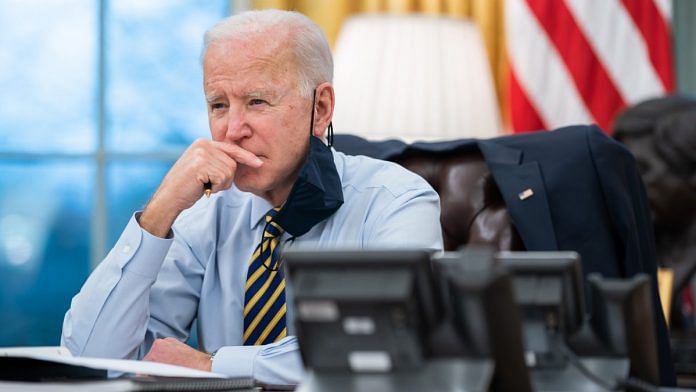Washington: President Joe Biden is sending about 3,000 U.S. troops to Kabul to help evacuate more diplomats from the U.S. embassy, underscoring just how badly the U.S. has been caught off-guard by the speed of the Taliban’s advance across Afghanistan as American forces withdraw.
The State Department is drawing down staff to a “core diplomatic presence,” but the embassy remains open and will continue its work, State Department spokesman Ned Price said at a briefing Thursday. The U.S. currently has about 4,200 people at its embassy, with a sizable portion of them American citizens.
“This is not abandonment, this is not an evacuation, this is not a wholesale withdrawal,” Price told a briefing. “We are in no way abandoning the people of Afghanistan. Far from it.”
But the move marks a further pullback of U.S. diplomats as the Biden administration says it’s determined to proceed with a plan to pull out almost all U.S. troops by Aug. 31. It’s a stark reflection of how ineffective Afghanistan’s government and its 300,000 troops have been in standing up to the Taliban, which has made swift and easy gains as U.S. troops withdrew. And it suggests that the administration thinks that Kabul, the heavily secured capital, might soon fall to the Taliban.
Canada also planned to deploy special forces in Afghanistan to help evacuate and close the country’s embassy in Kabul, the Associated Press reported late Thursday, citing a source it didn’t identify.
Infantry Battalions
Pentagon spokesman John Kirby told reporters that three infantry battalions will deploy to Kabul’s main airport in 24 to 48 hours. He said 3,000 personnel will join 650 U.S. troops already at the airport, describing the deployment as a “narrowly defined mission.”
In addition, an Army brigade combat team of 3,500 to 4,000 soldiers from Fort Bragg in North Carolina will deploy to Kuwait next week as a backup force in waiting, he said. A task force of 1,000 Army and Air Force personnel will go to Qatar to assist in processing visa applications from translators and others who helped U.S. forces and are now at risk.
The actions raised the possibility that the U.S. will move diplomatic operations to the Kabul airport if it can’t maintain security at the embassy, one of the largest American outposts in the world. One person familiar with the matter, who asked not to be identified discussing private deliberations, said administration officials had been considering that possibility if security worsens. CNN reported the possibility earlier Thursday.
Price and Kirby acknowledged that the new embassy drawdown was shaped by the Taliban’s surge. The State Department ordered an evacuation of nonessential personnel from the embassy in April.
“Our embassy remains open,” Price said. “Our diplomatic engagement on the ground will continue.”
The announcement will only fuel new questions from Biden’s critics about the withdrawal and whether his administration thought it through as it went ahead with the pullout.
Senate Minority Leader Mitch McConnell, who opposed the Afghanistan drawdown since it was first announced by former President Donald Trump, a fellow Republican, said in a statement Thursday that “the Biden administration has reduced U.S. officials to pleading with Islamic extremists to spare our embassy as they prepare to overrun Kabul.” He said the U.S. is “hurtling toward an even worse sequel to the humiliating fall of Saigon in 1975” and should commit to providing more support to Afghan forces.
U.S. officials have privately acknowledged shock at the swift pace of the Taliban’s advance, though they insist it’s possible for the Taliban and Afghan government representatives to make progress in talks that have been underway in Doha, Qatar, for months.
The U.S. special envoy for those talks, Zalmay Khalilzad, was in Doha on Thursday meeting with both sides. A key goal was to underscore to the Taliban that the U.S. and its partners wouldn’t grant legitimacy to any government that takes over the country by force.
“The speed of the collapse right now has taken everybody by surprise, including the Afghans who did argue for sustained forces and warned of Taliban gains,” said Scott Worden, director of Asian and Central Asia Programs at the U.S. Institute of Peace. “The pace of it is above and beyond what anyone I know anticipated.”
The swift pace of events also offered the uncomfortable image of Biden being forced to send troops back into Afghanistan just as the Pentagon was close to wrapping a withdrawal of about 7,000 troops who had remained in the country. The U.S. agreed with the Taliban to pull out those troops under an accord reached in early 2020 under Trump.
Now U.S. officials are wrestling anew with the likelihood that the Taliban used those negotiations as a way to ensure a U.S. withdrawal ahead of their own advances. According to another official familiar with the U.S. thinking, the current U.S. assessment is that the conflict will devolve into a stalemate between the Taliban, the Afghan government and various regional warlords, none of whom would have the ability to take full control of the country.—Bloomberg
Also read: Don’t forget us as we fight Taliban, says Afghan leader who thwarted Indian mission attack






